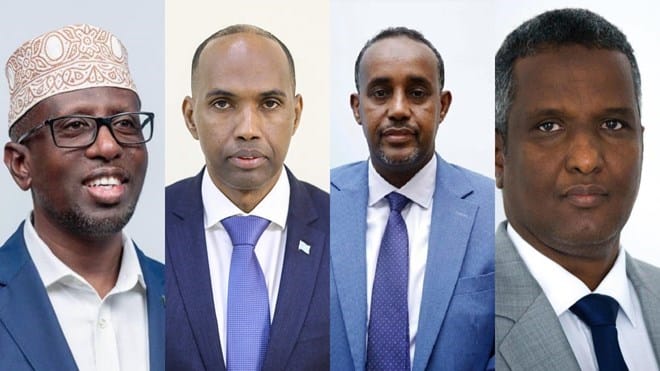A group of sixteen senior Somali political figures, including former presidents and prime ministers, have accused President Hassan Sheikh Mohamud of abandoning his constitutional role as a neutral national leader, instead deepening political divisions through the formation of the Justice and Solidarity Party (JSP).
In a strongly worded joint statement issued Tuesday night, the leaders expressed concern over what they described as the collapse of inclusive governance and the erosion of Somalia’s federal model, following the official launch of JSP, chaired by President Hassan Sheikh himself.
“The country is facing an unprecedented political crisis,” the statement read. “Rather than facilitating national dialogue on electoral, constitutional, and security challenges, the president is entrenching partisan divides.”
Among the signatories are influential figures such as former President Sharif Sheikh Ahmed, and ex-prime ministers Hassan Ali Khayre, Mohamed Hussein Rooble, Omar Abdirashid Sharmarke, and Abdi Farah Shirdon (Saacid). They accused the president of using state resources to build a centralized political alliance at the expense of Somalia’s delicate federal structure.
The group criticized the president for failing to maintain political neutrality, warning that the formation of JSP risks intensifying regional grievances, particularly in Jubbaland, where they claim the federal government is interfering in local affairs.
“We call on President Hassan Sheikh to cease his political interference in Jubbaland and respect the autonomy of federal member states,” the statement said.
The leaders also urged the presidents of Galmudug, Hirshabelle, and Southwest to reject what they described as a coordinated effort to weaken federalism and extend power beyond constitutional limits. They called on these leaders to honor democratic norms and refrain from aligning with what they characterized as a centralization campaign.
The criticism comes just days after the Justice and Solidarity Party held its inaugural congress in Mogadishu, where President Hassan Sheikh was elected party chairman and presidential candidate. The party’s leadership includes key figures from the federal government, such as Prime Minister Hamza Abdi Barre, Southwest President Abdiaziz Laftagareen, Deputy Prime Minister Salah Jama, and Deputy Speaker Sadia Yasin Samatar.
While the federal government has promoted JSP as a vehicle for advancing universal suffrage and democratic reform, opposition leaders and the Puntland administration have denounced it as an attempt to consolidate federal power, marginalize dissenting voices, and derail national reconciliation efforts.
The mounting criticism reflects Somalia’s increasingly polarized political climate as the country navigates critical constitutional reforms, electoral uncertainty, and the complex relationship between the federal center and its regional states.



